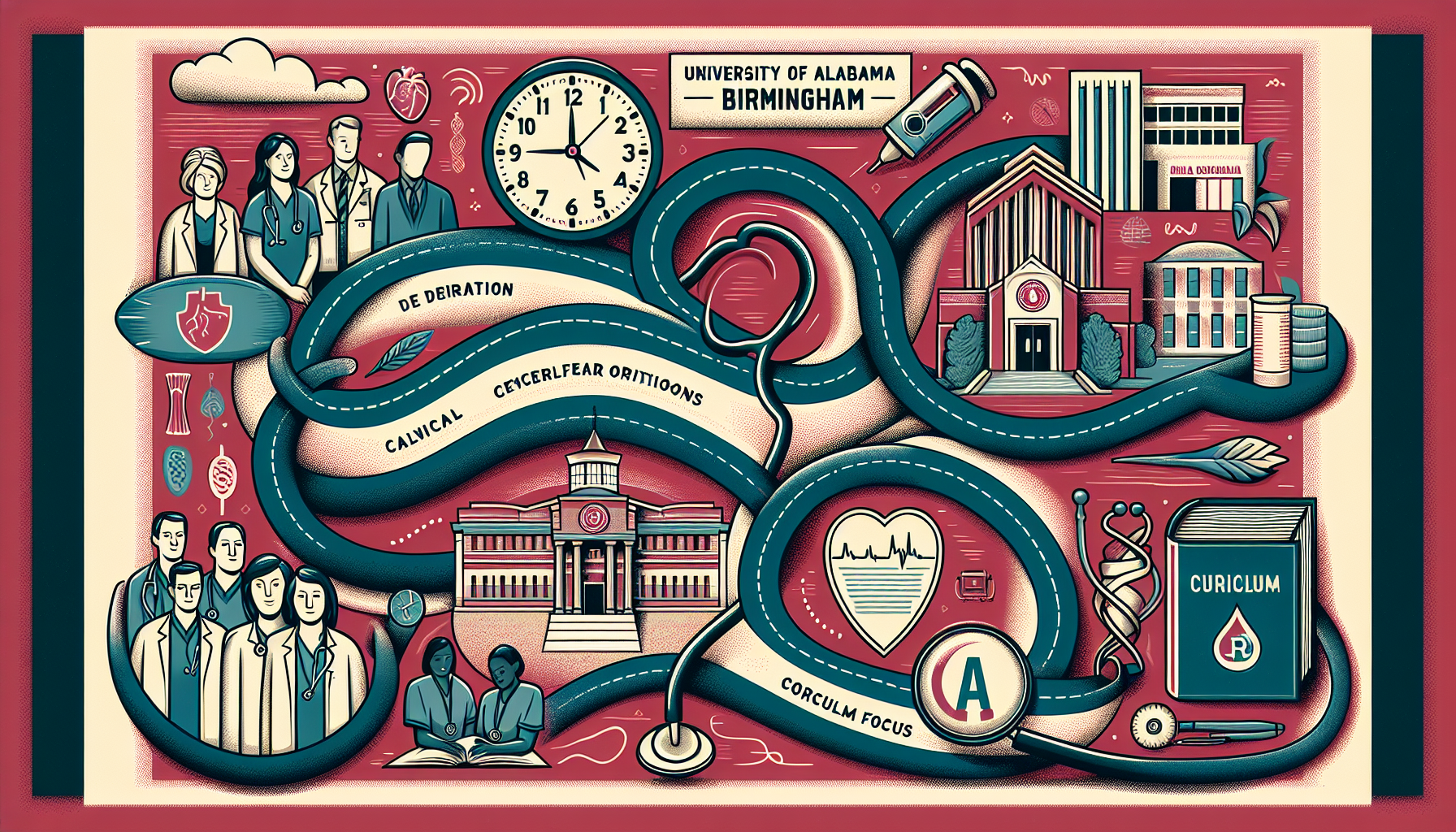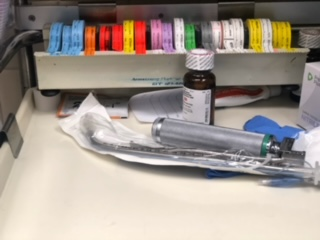UAB CRNA Program: Excellence in Nurse Anesthesia
If you are considering the University of Alabama Birmingham’s CRNA program, this article will provide you with all the necessary information you need to know.
The article will cover the complete details of the 36-month DNP program, the admission requirements, and the career benefits it offers. You will also learn about how UAB prepares you to excel in the challenging field of nurse anesthesia and helps you carve a path towards your future in healthcare.
Key Takeaways
- The UAB CRNA program is a 36-month DNP degree program that emphasizes both theoretical knowledge and practical clinical experience.
- Admission to the program involves a comprehensive evaluation process based on minimum GPA, GRE scores, and interviews.
- The program offers diverse clinical rotation sites in Alabama and Mississippi, and has competitive tuition rates with financial aid opportunities.
- It boasts a 3% attrition rate in 2023, above-average NCE pass rates, and a 97% post-graduation employment rate..
- One of 3 CRNA Schools in Alabama
Exploring the UAB CRNA Program: A Comprehensive Overview

Known for its robust curriculum and exemplary faculty expertise, the UAB CRNA program offers the following features:
- 36-month, full-time program
- Leads to a Doctor of Nursing Practice (DNP) degree
- Comprehensive nature allows for a diverse and enriching nurse anesthesia practice
- Prepares students to excel as Certified Registered Nurse Anesthetists (CRNAs)
With a rich mix of clinical and research backgrounds, the faculty at UAB guarantees top-notch anesthesia training. As the program unfolds, students engage in comprehensive clinical rotations across various sites in Alabama and Mississippi, gaining exposure to a wide array of clinical cases and operative settings.
Program Duration and Degree Path
The UAB CRNA program is a 36-month program that aims to provide students with both theoretical knowledge and practical experience.
Upon completion, students receive a DNP degree, which is a testament to the program’s academic rigor and excellence.
The curriculum is designed to integrate the DNP core curriculum with the clinical specialty curriculum for nurse anesthesia, which enables students to understand the anesthetic effects of non-anesthetic pharmacological agents.
The program’s main focus is to cultivate students’ leadership, research, and evidence-based practice skills. This is achieved through an extensive hands-on clinical practicum that covers a wide range of clinical specialties, including anesthesia pharmacology.
Clinical Rotations Across Alabama

Students are encouraged to participate in clinical rotations at numerous sites across Alabama and Mississippi, including the University of Alabama and in cities such as:
- Birmingham
- Montgomery
- Tuscaloosa
- Florence
- Huntsville
- Dothan
- Mobile
- Jackson
This practical experience provides students with comprehensive anesthetic exposure, preparing them for diverse work environments.
Throughout these rotations, students are exposed to a wide variety of cases, including:
- pediatrics
- obstetrics
- geriatrics
- open heart
- neurological
- plastic
- otolaryngology
- ophthalmology
- urology
- orthopedics
These experiences foster a strong foundation in anesthesia principles, ensuring graduates are well-equipped to handle the multifaceted demands of nurse anesthesia practice.
Faculty Expertise and Curriculum Focus
The faculty at UAB program is renowned for its knowledgeable and experienced educators.
These faculty members have diverse backgrounds and demonstrate a high level of qualification, which enriches the learning experience for students.
The faculty members incorporate advanced clinical courses and innovative teaching methods, creating an engaging learning environment that promotes active student participation. The program’s curriculum combines the DNP core curriculum with the clinical specialty curriculum for nurse anesthesia, supplemented by advanced clinical experiences.
This combination prepares students for evidence-based professional practice, ensuring that UAB CRNA graduates are fully equipped to make significant contributions to the healthcare industry.
UAB Program Accreditation:
Accrediation Status: Continued Accreditation
Date Of Last Review: May 2021
Date Of Next Review: May 2031
The Nurse Anesthesia Post-BSN to DNP Pathway achieved IFNA Accreditation in August 2021, meeting all standards of the Anesthesia Program Approval Process set by the International Federation of Nurse Anesthetists, with its next evaluation due in July 2026. Additionally, this pathway is accredited by the Council on Accreditation of Nurse Anesthesia Educational Programs (COA), maintaining full accreditation until May 2031
Admission Requirements and Application Insights
Gaining admission into the UAB CRNA program requires:
- A minimum cumulative GPA of 3.2 for all undergraduate coursework
- A minimum cumulative GPA of 3.0 for science prerequisites
- A baccalaureate degree in nursing from an accredited program
- A valid RN license to practice in the U.S.
The UAB CRNA program’s application process includes:
- A thorough review of the applicant’s academic qualifications
- Review of GRE scores
- Review of supporting documents
- An interview process
This process is structured to provide a fair and thorough assessment of every applicant, including those who have completed prior evaluations.
Academic Prerequisites and Certifications
Prospective applicants aiming for admission into the UAB CRNA program need to fulfill certain academic prerequisites. This includes the successful completion of courses in Microbiology, Descriptive Statistics, and Human Physiology. These prerequisites ensure that students are well-prepared for the rigorous academic curriculum of the program.
In addition to academic prerequisites, prospective applicants are required to possess specific certifications. This includes a Baccalaureate degree in Nursing, a valid RN license to practice in the U.S., and certifications in BY 261 Microbiology, MA 180 Descriptive Statistics, and BY 116 Human Physiology. Furthermore, BSN-prepared candidates must present verification of CNOR certification, and all students must ensure they possess current ACLS, BLS, and PALS Certifications and hold an Alabama Compact License.
The Application Process Explained
The application process for the UAB CRNA program is very thorough in selecting the most qualified candidates. To apply, you must submit a complete application through the UAB Graduate School website. The application must include all the supporting documents in a single PDF document to the Nurse Anesthesia Pathway.
Your GRE scores are also significant in the application process which must be taken within the past five years. There is no Minimum score required.
The deadline for submitting your application to the UAB CRNA Program is May 1st. Ensure that you submit your application before the deadline.
Financial Investment: Tuition and Scholarships

Pursuing the UAB CRNA program requires a considerable financial investment. Here are the costs associated with the program:
- In-state tuition: $86,033
- Out-of-state tuition: $170,963
- Educational Support and Technology Fee (per course): $235
- Anatomy Lab fee: $387
- Other related estimated expenses
To help offset the cost of tuition, UAB offers a range of financial aid options for eligible students, including:
- Scholarships
- Traineeships
- Fellowships
- Loan programs
These options aim to ease the financial burden and make the program more accessible to a larger pool of students.
Breakdown of Tuition Costs
Tuition costs for the UAB CRNA Program are categorized into in-state and out-of-state rates. In-state students can expect an estimated tuition cost of $100,000. Notably, these costs are subject to annual adjustments, typically with increases ranging from 5% to 15% higher than the previous year.
Out-of-state students are required to pay a higher tuition fee, which stands at $170,963. This difference in tuition fee structures between in-state and out-of-state students is not uncommon and is practiced by many universities across the country.
Scholarship Opportunities
Beyond traditional financial aid options, UAB School provides a variety of scholarships to qualifying students. To qualify for these scholarships, students must have been admitted to or currently enrolled full-time in the School of Nursing and maintain a minimum cumulative GPA of 3.0 on a 4.0 scale.
The scholarships available include both endowed scholarships and sponsored scholarships. While the average scholarship amount is not specified, the availability of these numerous financial aid options makes the UAB CRNA program a financially viable choice for many students.
Contact Information for Tuition and Financial Aid
For detailed information on tuition, scholarships, loans, and grants, you can reach out to the UAB Office of Student Financial Aid. They are equipped to provide comprehensive guidance on the various financial aid options available to students, including scholarships, traineeships, fellowships, and loan programs.
Office of Student Financial Aid
- Email: finaid@uab.edu
- Phone: (205) 934-8223
- Website: www.uab.edu/students/paying-for-college/contact
For specific inquiries related to the CRNA program, you can contact the School of Nursing’s financial aid office at:
School of Nursing Financial Aid Office
- Email: nursingfinaid@uab.edu
- Phone: (205) 975-7529
Remember, financial aid can significantly offset the cost of tuition, making your educational journey more affordable. The financial aid staff at UAB are committed to helping you explore all available options and navigate the financial aid process.
Key Aspects to Consider in Education Expenses
Beyond tuition, remember to account for additional costs like fees, books, and supplies.
If relocating for school, factor in rent and living expenses, as many CRNA programs don’t offer on-campus housing. Consider transportation, food, entertainment, and unforeseen expenses like car repairs.
Being financially prepared is crucial to avoid disruptions in your education journey
Class Size, Attrition, and Success Rates

The UAB CRNA program takes pride in its substantial class size, minimal attrition rate, and impressive success rates. The program admits around 45 students per cycle, a response to the growing workforce demand in Alabama and neighboring states. The attrition rate is reported to be 0%, significantly lower than national averages for CRNA programs.
The program also boasts impressive success rates. UAB CRNA graduates exhibit a commendable initial pass rate of 86% on the National Certification Exam (NCE), exceeding the national average of 83%. The program’s commitment to student success is evident in its employment rate, with 97% of graduates securing employment immediately after graduation.
Cohort Dynamics
Over the years, the Birmingham CRNA program at UAB has experienced consistent growth in its class size. This growth is a response to the growing demand for healthcare professionals in Alabama and neighboring states. The program has grown from:
- 29 students in 2015
- 35 students in 2016
- 42 students in 2017
- 48 students in 2018
- 53 students in 2022
This growth reflects the program’s commitment to providing high-quality education and meeting the needs of the healthcare industry.
This steady increase in class size is a testament to the program’s success and the increasing recognition of the value of certified registered nurse anesthetists in the healthcare sector.
As the demand for CRNAs grows, the UAB CRNA program continues to expand its reach and impact in the realm of nurse anesthesia education, producing highly skilled certified registered nurse anesthetist professionals.
Performance Metrics
The performance metrics of the UAB CRNA program highlight its dedication to excellence, making it one of the top CRNA schools. The program boasts:
- An impressive initial pass rate of 86% on the National Certification Exam (NCE), exceeding the national average of 83%
- A rigorous academic curriculum
- Comprehensive clinical training
These factors contribute to the program’s high pass rate at a regionally accredited institution and demonstrate its commitment to providing quality education and training.
Furthermore, the program’s commitment to student success extends beyond graduation. A remarkable 97% of UAB CRNA graduates secure employment immediately after graduation. Many of these graduates accept positions at one of their clinical sites, underscoring the program’s dedication to job placement within the state.
Career Prospects Post-Graduation

Graduates from the UAB CRNA program are thoroughly prepared to:
- Take on complex leadership roles that influence clinical practice and healthcare delivery at both organizational and systems levels
- Enhance health outcomes
- Undertake executive health system leadership roles
- Advocate for evidence-based methodologies.
The program’s focus on evidence-based practice equips its graduates to enhance patient care and cultivate essential leadership skills for the efficient administration and progression of healthcare initiatives. The nurse anesthesia program prepares them to take on roles that demand a high level of expertise and proficiency in nurse anesthesia practice.
Employment Rate and Job Placement
The UAB CRNA program excels in its employment rate, with an impressive 97% of graduates finding work immediately after graduation. This high employment rate is a testament to the program’s academic rigor, comprehensive clinical training, and dedicated job placement efforts.
Graduates of the program are well-equipped to pursue a variety of career paths. Many take up roles in promoting evidence-based practice, ensuring patient safety, enhancing quality in healthcare, and demonstrating leadership skills. Some graduates also secure positions at various clinical sites, including practices in ketamine clinics and working in medically underserved areas.
Leadership and Quality Improvement Skills
The UAB CRNA program’s emphasis on developing leadership and quality improvement skills in its students is one of its key strengths. The program instills skills that enable graduates to:
- Promote evidence-based practice
- Ensure patient safety
- Enhance quality in healthcare
- Develop effective teamwork capabilities
The program’s curriculum integrates a quality improvement project during the Doctor of Nursing Practice pathway, typically at the student’s clinical site. This focus on quality improvement equips graduates with the skills and knowledge necessary to drive improvements in healthcare delivery and patient outcomes.
The LEAP Initiative: Enhancing Diversity in Nurse Anesthesia

In line with its dedication to diversity and inclusion, the UAB CRNA program has launched the Leadership Excel and Achievement Program (LEAP). This initiative is designed to enhance the representation of nurse anesthetists from diverse backgrounds and enhance patient care outcomes.
The LEAP initiative:
- Recognizes the importance of diversity in serving a diverse population
- Contributes to advancing patient care in Alabama and beyond
- Supports minority student success in admission to nurse anesthesia programs
- Enhances diversity in the nurse anesthesia workforce at UAB
International Application Students
UAB DNP Program: International Student Admission Guide
International students interested in UAB’s DNP Program should first reach out to UAB International Admissions for eligibility and application procedures.
Contact UAB International Admissions:
- Email: IntlAdmin@uab.edu
- Phone: 205.934.4686
- Fax: 205.934.8664
DNP Program Eligibility Overview:
- Visa Requirements: F1 or J1 Visa holders not eligible
- Academic Requirements: Bachelor’s degree in nursing (BSN equivalent), evaluation of foreign transcripts
- Language and Testing Requirements: English proficiency, GRE scores (within last 5 years), TOEFL iBT score of 80 (minimum 18 in each section) or IELTS score of 6.5 (minimum 6.0 in 2 sections)
- Licensure Requirement: RN license in the U.S.
Additional Application Criteria:
- Educational Background: Master’s degree in nursing from a regionally accredited U.S. institution
- Licensure for Clinical Programs: RN license in the U.S., specifically in the state of program completion
- Transcript Evaluation Services:
- Educational Credential Evaluators, Inc. (www.ece.org)
- World Education Services (www.wes.org)
- Minimum GPA: 3.0 on a 4.0 scale
- Admission Interview: Mandatory part of the application process
This summary provides key information for international appli
Alumni Perspectives and Testimonials
Alumni perspectives best illustrate the strength and value of the UAB CRNA program. Many alumni speak highly of the program, highlighting the following:
- The faculty’s expertise and dedication to teaching
- The wide range of learning opportunities provided
- The positive impact of educators on their professional development
These testimonials demonstrate the program’s commitment to excellence and the success of its graduates.
UAB CRNA program alumni have:
- Effectively transitioned into roles as proficient nurse anesthetists
- Applied their extensive education to their professional endeavors
- Assumed mentorship responsibilities
- Made significant contributions, including the establishment of scholarships.Living in Birmingham, Alabama While Attending the UAB CRNA Program
Living in Birmingham, Alabama
Studying CRNA at UAB in Birmingham, Alabama, offers an affordable lifestyle with reasonable living costs. The median rent is about $1,000 in the city and $800 outside, with manageable expenses for utilities, groceries, and transport.
Birmingham, rich in culture and activities, provides diverse experiences from arts and history at the Birmingham Museum of Art and Civil Rights Institute, to nature at the Botanical Gardens and Ruffner Mountain. Sports fans and foodies will find plenty to enjoy, with a vibrant nightlife adding to the city’s appeal. CRNA students can expect a balanced academic and recreational life.
In Alabama, CRNAs typically earn between $160,000 to $180,000 annually, a competitive salary compared to the national average. This figure varies based on experience, location, and workplace.
Urban areas like Birmingham may offer higher salaries due to greater demand and living costs. The job outlook for CRNAs in Alabama is strong, with growing healthcare needs hinting at future salary increases and more opportunities.
Summary & Additional details
In conclusion, the UAB CRNA program offers a comprehensive, rigorous, and enriching educational experience that prepares students for a rewarding career in nurse anesthesia.
From its diverse and hands-on clinical rotations, committed faculty, and robust curriculum to its leadership and quality improvement focus, the program stands out as a leading institution for nurse anesthesia education.
For prospective students, embarking on this journey is not just a significant academic commitment, but also a step towards a fulfilling career in healthcare, serving diverse communities, and making a real difference in patient outcomes.
Frequently Asked Questions
Does UAB have a CRNA program?
Yes, the University of Alabama (UAB) offers a Nurse Anesthesia CRNA Program, which is one of the largest CRNA schools in Alabama and the country.
How much does UAB pay CRNA’s?
CRNAs at UAB Medicine have an average salary of $174,225 per year, which is 12% below the national average. This range is consistent with the national average for this position.
How many CRNA programs are in Alabama?
There are three CRNA programs in Alabama: at the University of Alabama at Birmingham, Samford University in Birmingham, and the University of Mobile. Choose the one that best fits your needs and goals.
What is the duration of the UAB CRNA Program?
The UAB CRNA Program is a 36-month, full-time program, providing comprehensive education in nurse anesthesia.
What are the academic prerequisites for the UAB CRNA Program?
To be eligible for the UAB CRNA Program, you need to have completed courses in Microbiology, Descriptive Statistics, and Human Physiology. This is essential for meeting the academic prerequisites
How do I find other CRNA Schools
You can search CRNA Schools by State and see what states have CRNA Programs and compare them to each other.
UAB Nurse Anesthesia Program Location

School of Nursing 1701 University Boulevard
Birmingham, AL 35294
(205) 934-5428
Contacts:
| Jacqueline Lavier M.ed DNP Pathway Manager Office of Student Success jlavier@uab.edu (205) 975-7529 | Susan McMullan PhD, CRNA DNP Nurse Anesthesia Pathway Director susanpmcm@uab.edu (205) 934-6587 |
Accreditation:
Accrediation Status: Continued Accreditation
Date Of Last Review: May 2021
Date Of Next Review: May 2031
The Nurse Anesthesia Post-BSN to DNP Pathway achieved IFNA Accreditation in August 2021, meeting all standards of the Anesthesia Program Approval Process set by the International Federation of Nurse Anesthetists, with its next evaluation due in July 2026. Additionally, this pathway is accredited by the Council on Accreditation of Nurse Anesthesia Educational Programs (COA), maintaining full accreditation until May 2031
Admission Requirements:

- Undergraduate Grade Point Average (GPA) of at least 3.0 on 4.0 Scale
- 3.0 GPA in science prerequisites and a minimum ‘C’ grade in all other prerequisite courses
- Applicants must complete a BSN from a regionally accredited institution, or an equivalent degree by application deadline.
- Applicants need an active, unencumbered RN license in the state where their coursework, including clinicals, will be completed. Upon admission, a multi-state compact license is required before starting the Post-BSN to DNP Pathway for Nurse Anesthesia
- Before the July application interview, candidates must have a minimum of 11 months of RN experience in critical care and must maintain employment in this setting until the program begins in May. Recent critical care experience, preferably within the last 4 years, is advised
- Candidates must gain critical care experience in a U.S.-based or U.S. military hospital
- Critical care: one a regular basis manages one or more of the following: invasive hemodynamic monitors (e.g., pulmonary artery, central venous pressure, and arterial catheters), cardiac assist devices, mechanical ventilation, and vasoactive infusions
- GRE is Required: Must be taken within the last 5 years
- Three professional reference letters endorsing the candidate’s suitability for graduate studies
- Personal Interview with admissions committee
- $2500 Non-refundable deposit if admitted into program to hold seat
Prerequisite Courses:
Per the University of Alabama at Birmingham Nurse Anesthesia program there a some classes that must be taken before enrollment into the program.
These Classes include the following:
| Prerequisite Courses | Credit |
|---|---|
| BY 115 Human Anatomy1 | 3-4 |
| BY 261 Microbiology | 3 or 4 |
| MA 180 Descriptive Statistics | 3 |
| BY 116 Human Physiology1 | 3-4 |
| CH 105/106 Chemistry1 OR CH 115/116 Chemistry1 | 3-4 |
| MA 110 Finite Math2 OR MA 105 Pre-Calculus2 | 3 |
| [Anatomy, Physiology, and Chemistry must be completed with a lab course] | |
Application Dates & Deadlines
- Subimission of Application- May 1st
- Notification of Applicant Interview: June 1st
- Interview Completion: July
- Notification of Acceptance to Program: 2 Weeks after Interview
- School Starts: The Following Summer semester ( Next Year)
Tuition Cost
In state Tuition: $88,770
Out of State Tuition: $191,484
Financial Aid and Scholarship Information

For details on financial aid, university scholarships, and other funding opportunities, consult the following resources:
UAB Office of Financial Aid
- Email: FinAid@uab.edu
- Phone: 205.934.4011
UAB School of Nursing Scholarships
- The School offers 76 endowed and 3 active sponsored scholarships from a $10.1 million fund.
- Scholarships are awarded biannually in spring and fall.
- Application details: UAB Nursing Scholarships
Contact for Nursing Scholarships
- Name: Stephanie Hamberger, MPA
- Role: Director of Student Engagement, Recruitment and Scholarships
- Email: ssallen@uab.edu
- Phone: 205.934.5483
Graduate Program Funding
- Limited Graduate Fellowships and Traineeships are available.
- Contact: Katrina Staffney
- Email: KatrinaStaffney@uab.edu
Nurse Faculty Loan Information
- Federal Nurse Faculty Loan Funds for DNP students planning faculty careers.
- Contact: JoeAnn Kennedy
- Email: joeann@uab.edu
This information sheet provides a concise overview of financial support options for students at UAB.
Previous Class Accomplishments
| Class of 2022 | Class of 2023 |
| -Attrition rate was 2%. -Recorded an 86% first-time NCE pass rate at UAB, compared to an 83% national average. -98% of graduates gained employment within six months of graduation. | -Attrition rate stands at 3%. -Achieved a 96% first-time pass rate on the National Certification Examination (NCE). -Maintained a 100% overall NCE pass rate. |
In Conclusion
The University of Alabama at Birmingham (UAB) offers a distinguished CRNA program known for its exceptional education and training in nurse anesthesia.
UAB’s CRNA school provides students with a comprehensive curriculum, blending rigorous academic coursework with practical clinical experience. The program is designed to prepare graduates for a successful career in this dynamic and rewarding field.
For those interested in exploring CRNA programs across different states, a comprehensive overview of all state CRNA schools can be found by visiting CRNA Schools By State. This resource offers valuable information for prospective students seeking to find a program that best fits their educational and career goals.


